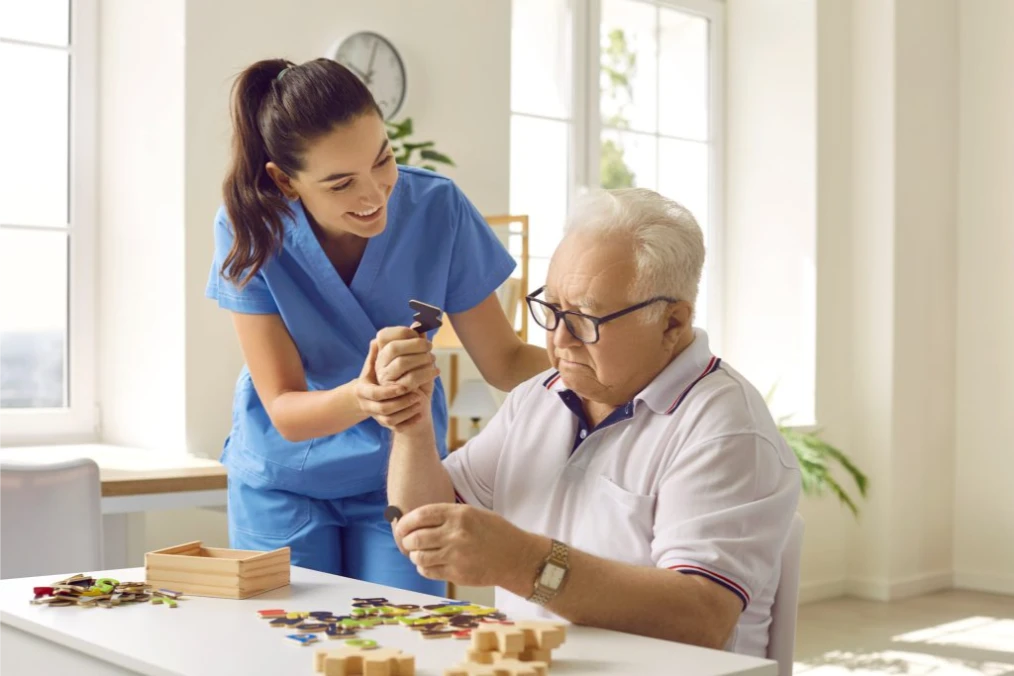Caring for a loved one with Alzheimer’s disease or dementia can be both rewarding and challenging. As the disease progresses, daily life becomes more complex, requiring caregivers to adapt and provide extra support. Whether you’re a family caregiver or a professional, managing Alzheimer’s and dementia at home requires patience, flexibility, and the right strategies to ensure your loved one’s comfort and safety.
At Always Best Care, we are committed to providing helpful resources and support for families navigating the complexities of Alzheimer’s and dementia care. In this blog post, we’ll share some top tips for managing Alzheimer’s and dementia at home, making life easier for both caregivers and their loved ones.
1. Establish a Routine
One of the most effective ways to manage Alzheimer’s or dementia at home is to establish a daily routine. Consistency provides structure, which can help reduce anxiety and confusion for your loved one.
- Create a Daily Schedule: Develop a routine that includes specific times for meals, activities, and rest. Keeping things predictable can help minimize agitation and stress.
- Incorporate Familiar Activities: Include activities your loved one enjoys, such as walking, reading, or listening to music. This not only adds structure but also brings comfort.
- Set Reminders: Use calendars or clocks with large fonts to help your loved one keep track of the day and time.
Having a routine helps your loved one feel more secure and reduces the frustration that can come from not knowing what’s next.
2. Create a Safe Environment
As dementia progresses, individuals may experience memory loss, confusion, and difficulty recognizing hazards. Ensuring a safe environment is crucial to prevent accidents and provide peace of mind for both the caregiver and the individual.
- Remove Hazards: Keep sharp objects, medications, and toxic substances out of reach. Secure rugs, eliminate tripping hazards, and make sure furniture is sturdy.
- Install Safety Features: Consider adding safety bars in the bathroom, using nonslip mats in the shower or bathtub, and installing night lights to help with vision during the night.
- Label Important Items: Use labels or signs around the house to help your loved one recognize rooms or important items (such as the bathroom or fridge).
- Create a Quiet Space: Dedicate a quiet space for your loved one to retreat to when feeling overwhelmed or confused. This can help them relax and regroup.
A safe home environment allows individuals with Alzheimer’s or dementia to remain as independent as possible while reducing the risk of accidents.
3. Communicate Effectively
Communication challenges are common as dementia progresses. It can be difficult for individuals with Alzheimer’s to express themselves clearly, and they may also struggle to understand what others are saying. Clear and simple communication is essential.
- Use Simple Language: Speak slowly, using short, clear sentences. Avoid complex words or long explanations.
- Be Patient: Give your loved one extra time to process information and respond. Avoid finishing their sentences or interrupting them.
- Nonverbal Cues: Pay attention to body language and facial expressions, as they may communicate more than words.
- Stay Calm: If your loved one becomes upset or confused, remain calm and composed. Your calm demeanor can help them feel more secure.
- Redirect if Necessary: If your loved one becomes fixated on something or confused, gently redirect the conversation or change the subject to something they enjoy.
Effective communication builds trust, minimizes frustration, and enhances your loved one’s ability to engage with you and others.
4. Promote Independence
While it’s important to provide assistance when needed, it’s equally essential to promote your loved one’s independence and allow them to do as much as possible on their own.
- Encourage Daily Tasks: Let your loved one help with simple tasks like folding laundry, setting the table, or feeding pets. These activities help them feel a sense of accomplishment and maintain a sense of dignity.
- Adapt Tasks: Modify activities to make them easier to perform. For example, use adaptive tools (such as easy-grip utensils or large-button phones) that make daily tasks more manageable.
- Offer Choices: Allow your loved one to make simple choices, such as picking out their clothes or deciding between two meals. This promotes autonomy and keeps them involved in decision-making.
Promoting independence allows your loved one to retain a sense of control and helps maintain their self-esteem.
5. Monitor Nutrition and Hydration
Alzheimer’s and dementia can affect appetite and eating habits, leading to weight loss, dehydration, or poor nutrition. Monitoring nutrition and hydration is critical to maintaining health and energy levels.
- Offer Small, Frequent Meals: If your loved one has difficulty finishing large meals, offer smaller portions throughout the day.
- Hydrate: Dementia can cause individuals to forget to drink, increasing the risk of dehydration. Keep water within reach and offer it regularly.
- Provide Nutrient-Dense Foods: Focus on foods rich in vitamins and minerals, such as fruits, vegetables, whole grains, and lean proteins. Try incorporating brain-boosting foods like salmon, berries, and nuts.
- Use Easy-to-Eat Foods: If your loved one has difficulty using utensils or chewing, opt for soft foods or finger foods that are easier to manage.
Good nutrition and hydration are vital to your loved one’s overall well-being and can help manage symptoms like fatigue and irritability.
6. Provide Mental Stimulation
Keeping the mind engaged can help slow the progression of dementia and improve mood and quality of life.
- Memory Games: Simple memory games, such as matching cards, puzzles, or reminiscing about past events, can help stimulate cognitive function.
- Arts and Crafts: Activities like painting, knitting, or simple DIY crafts can be both fun and mentally engaging.
- Music and Dance: Listening to familiar music or dancing to favorite tunes can evoke positive memories and provide emotional comfort.
- Exercise: Physical activity not only improves physical health but also stimulates the brain. Gentle exercises like walking or chair yoga are great for seniors with dementia.
Stimulating your loved one’s mind can help improve mood and cognitive abilities, leading to a higher quality of life.
7. Practice Patience and Flexibility
Alzheimer’s and dementia can bring unpredictable changes in behavior and mood. Patience is one of the most valuable tools in caregiving.
- Expect the Unexpected: Your loved one may act out of character due to confusion, anxiety, or memory loss. Try not to take their actions personally, and adjust your approach as needed.
- Adapt to Changing Needs: As the disease progresses, your loved one’s needs will change. Be flexible and willing to adjust routines, caregiving strategies, and home environments as necessary.
- Seek Support: Caring for someone with dementia can be emotionally and physically taxing. Reach out to family members, support groups, or professional caregivers to share the load and gain emotional support.
By maintaining a flexible and patient mindset, you can better handle the challenges of caregiving while providing the best possible care for your loved one.
Managing Alzheimer’s and dementia at home requires a combination of patience, creativity, and proactive planning. By establishing a routine, creating a safe environment, communicating effectively, promoting independence, monitoring nutrition, and offering mental stimulation, you can provide your loved one with the support they need to live a fulfilling life at home.
If you need additional help or resources, ALWAYS BEST CARE is here to provide in-home care and support for families navigating Alzheimer’s and dementia care. Reach out to us today for guidance, care options, and support. Together, we can make this journey a little easier for both you and your loved one.








